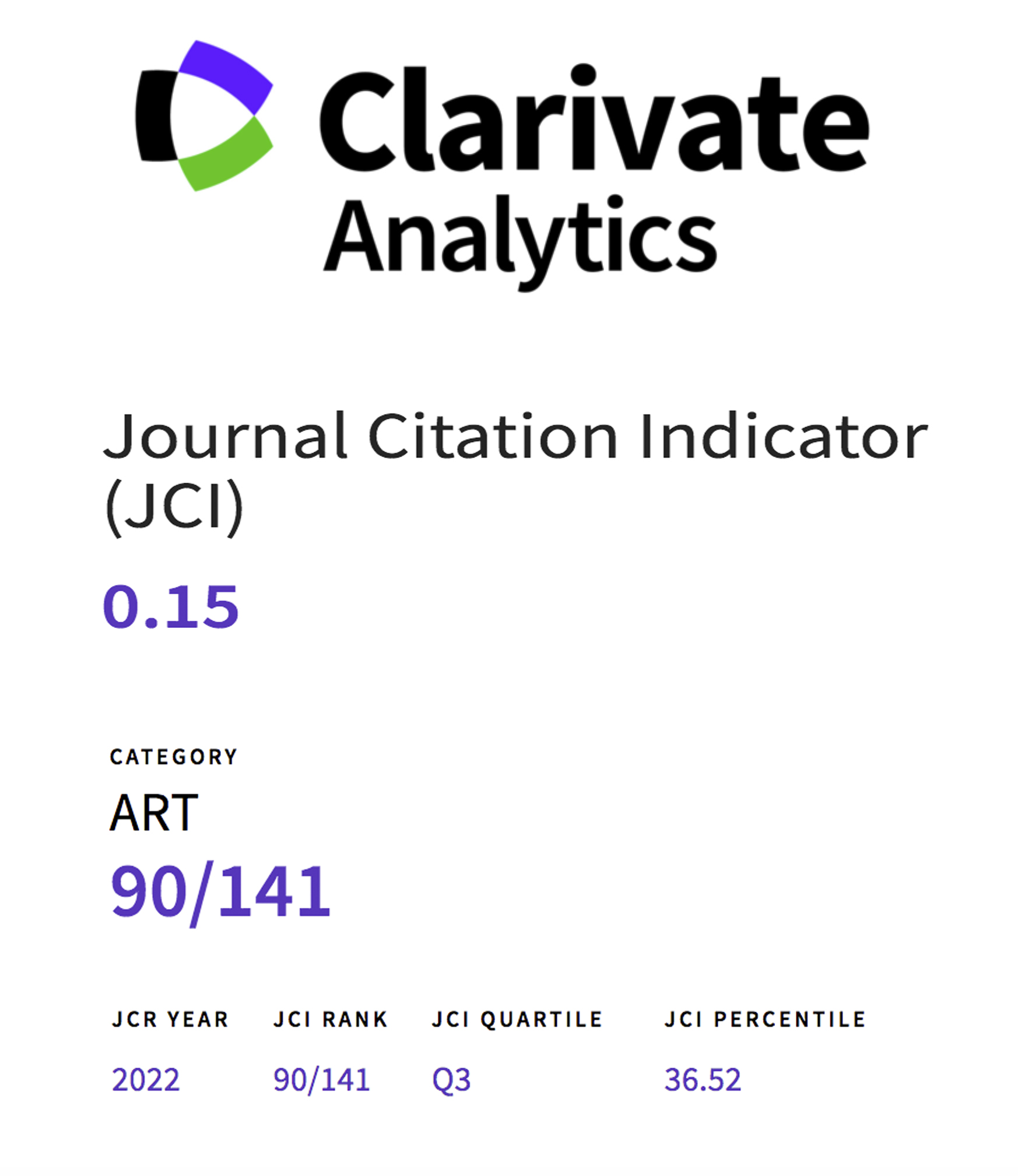You here still and silent. A reflection on the artivist conquest of visual discourse by five Colombian artists
Abstract
This article analyzes, from the specific cases of Colombian artists: Debora Arango, Clemencia Lucena, Beatriz Gonzalez, Maria Eugenia Trujillo and Nadia Granados, how through their artistic approaches, they have managed to conquer a critical position regarding social and political problems of the country, such as: violence, corruption and drug trafficking, demonstrating from their artivist position that their condition as women does not mean the silencing of their positions in this regard. Throughout this text, which gathers the results of the study, whose research methodology encompasses four approaches: contextual, iconographic, comparative and gender perspective. Check how the referenced works, dated between the 20th and 21st centuries, have not only presented their critical questions, but have managed to surpass, through their visual discourse, spaces of power and opinion previously occupied only by men and, in turn, From the exhibition spaces to the network, they have come to forcefully counteract the situation of invisibility and stereotyping of this group in the artistic environment.
Downloads
References
Barón Pino, M. S. (2011). Pekín informa: feminismos y militancias en Clemencia Lucena. Obtenido de http://www.revistavozal.org/?p=765
Centro nacional de memoria histórica (5 de noviembre de 2014). Palacio de Justicia. Obtenido de https://centrodememoriahistorica.gov.co/tag/palacio-de-justicia/#:~:text=Durante%20la%20toma%20por%20parte,tambi%C3%A9n%2011%20personas%20fueron%20desaparecidas.https://doi.org/10.2307/j.ctv14jx8fd.5
Deepwell, K. (2000). Nueva crítica feminista de arte. Valencia: Catedra.
Díaz Aguirre, A. (2022, 27 de febrero). “La ‘Colombianización’ es una enfermedad”: Nadia Granados, ganadora del Premio Luis Caballero. Diario criterio. https://diariocriterio.com/nadia-granados-colombianizacion-premio/ https://doi.org/10.14483/25009311.21237
González, B. (1996). Las delicias. Recuperado el 10 de mayo de 2023, de https://museodememoria.gov.co/bga/delicias.html
Granados, N. (s.f.). Colombianización.com. Obtenido de https://colombianizacion.com/capitalizmo-gore/
Hemispheric institute. (19 de 01 de 2013). Nadia Granados, La Fulminante: Oración contra el silencio. Recuperado el 31 de 05 de 2023, de https://hemisphericinstitute.org/es/enc13-exhibitions-installations/item/2076-enc13-ngranados-fulminante.html
Laverde Toscano, M. C. (1999). Desplazamientos, decisiones y transitos en la obra de Beatriz González. Nomadas(10), 108-122.
Peña, P. (03 de 31 de 2022). Colombianización: una enfermedad que requiere cura. artishock revista de arte contemporaneo. Recuperado el 10 de octubre de 2022, de https://artishockrevista.com/2022/03/31/colombianizacion-nadia-granados/ https://doi.org/10.33110/cimexus170204
Pérez-Rubí, A. (2021). Artivismo: El poder de los lenguajes artísticos para la comunicación política y el activismo. Barcelona: Editorial UOC.
Rincón, O. (s.f). Nadia Granados. Obtenido de https://nadiagranados.com/inicio/colombianizacion/
Robayo Alonso, A. (2001). La crítica a los valores hegemónicos en el arte colombiano. Bogotá: Convento Andrés Bello.
Ruiz Mendoza, M. (2019). Reinvenciones del archivo: imagen, historia y memoria en la obra de Beatriz González. Revista de Estudios Colombianos(54), 39-49. https://doi.org/10.53556/rec.v54i0.68
Schuster , S. (2011). Arte y violencia: la obra de Débora Arango como lugar de memoria. Revista de Estudios Colombianos, 35-40.
Serrano, E. (1995). La mujer y el arte en Colombia. En M. Velásquez, las mujeres en la historia de Colombia (Tomo: III Mujeres y Cultura). (pp. 256 -273). Grupo Editorial Norma. https://doi.org/10.2307/jj.2059209.17
Trujillo, M. E. (3 de noviembre de 2017). Conozca la exposición "floreros paralelos". (C. tv, Entrevistador) Obtenido de https://www.facebook.com/citytv.com.co/videos/10155459724284475/
Valencia, S. (2020). "Nadia Granados y el Drag King Gore.". Sociocriticism, 1(35), 2.
Young, I. (1981). Marxismo y feminismo, más allá del "matrimonio infeliz" (una crítica al sistema dual). En L. Sargent, Women and revolution, a discussion fo the unhappy marriage of marxism and feminism, (págs. 43-69). Boston: South End Press.
Copyright (c) 2024 Servicio de Publicaciones de la Universidad de Murcia

This work is licensed under a Creative Commons Attribution-NonCommercial-NoDerivatives 4.0 International License.
Works published in this journal are subject to the following terms:
- The Service of Publications from the University of Murcia (publishing house) keeps the published works’ copyrights, and favors and allows the reuse of these works under the license indicated in point 2.
- Works are published in the journal’s online edition under the license Creative Commons Reconocimiento-NoComercial-SinObraDerivada 3.0 España(texto legal). They can be copied, used, disseminated, transmitted and publicly exhibited, as long as: i) the author and original source of publication are cited (journal, publishing house and work’s URL); ii) they are not used for commercial purposes; iii) the existence and specifications of this license are mentioned.
3. Conditions for auto-file. It is allowed and encouraged that authors share electronically their pre-print version (the pre-reviewed version) and /or post-print version (the reviewed and accepted version) of their Works before the publication, since it promotes its circulation and dissemination. RoMEO color: green.









